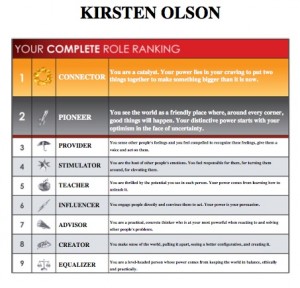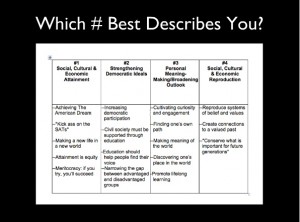As a Positive Psychology News subscriber, I recently completed an exceptionally perceptive and painless-to-administer online survey of my personal strengths, based on several decades of positive psychology research about the characteristics associated with positive outcomes in the workplace, authentic happiness, and thriving. There are many strengths assessments available, some of which have been taken by millions of people, and all are grounded in innovative research and ongoing, real-time practice in daily life. The one I took cost $15, could be completed in about 20 minutes, offered me an immediate PDF and interactive narrative final report of my top strengths and optimal roles, along with an explanation of when I am at my most powerful. In my case,
I am a “connector” and “pioneer,” an assessment I found useful and perceptive as I think about my work as an educational activist and consultant. (Page 5 of my report says, “You are a multiplier, always trying to put two things together to make something bigger and better than it is now.”)
In education, wouldn’t it be powerful if we had an online, research-based tool that would help us understand our own educational values and desires? In education we fight a lot, often not at all productively, about what are essentially value differences, while assuming, incorrectly, that we all believe the same things, that we want the same things for our kids, that the future parents and teachers wish for their children are all the same, and that we all essentially agree. We don’t.
For instance, over at the COOP where I blog, the gathered group tends to be pretty classically Progressive, and believe that education is a spiritual and integrative process that is best served by holistic, experiential, individualized learning experiences–ones that are about strentheng capacity for personal meaning making. (See Column #3 of the slide below.) At the COOP folks are also deeply concerned with creating a more civil society through education, and social justice issues.
I meet lots of parents for whom these are not their central concerns. These parents don’t believe that experiential, project-oriented, learner-constructed educational experiences are “real” or serioius, and don’t think schools and classrooms constructed in these ways will help their kids get into college or be successful in the world after school. Equally, I also meet parents and teachers who are interested in educational experiences for their children that specifically instruct kids in a particular moral, behavioral, or religious philosophy.
Yet based on the outrage and frustration of these many conflicting voices, it’s clear we don’t sufficiently understand our educational value differences, we don’t acknowledge them, and therefore, have a hard time working productively together on a larger vision of change. Not everyone wants a progressive, experiential education for their child. Some people really do believe that high-stakes testing prepares kids for the challenges they will face in their lives beyond high school. Many parents do want uniformity, strong and decisive discipline in school, want their children to be taught that they are part of a group rather than emphasizing their individuality, and think that a fair amount of compliance is helpful in creating good and productive citizens. That old John Dewey quote, “What the best and wisest parent wants for his own child, that must the community wants for all of its children,” just isn’t right anymore. There isn’t a best and wisest parent, the goals of education are too diverse, and the kinds of educational environments that are beginning to be available now are too varied for there to be one best and right way. We have poor ways of talking about this.
Wouldn’t it be helpful if we had an online, easy to administer, inexpensive, verified-by- research, thoughtful and non-judgmental tool for getting at these differences? If as a parent, I could go online and understand that what I really want for my children is an educational environment like that offered at Jamie Steckhart’s Northwest Passage High School in Minnesota (abundant choice, experiential learning), whereas my neighbor next door is much more interested in a school like SEI Charter Academy, in Portland OR, where children are rigorously disciplined, and offered a full-range of support services and extracurriculars, but must maintain a code of conduct for receipt of those services?
The issue is, of course, we don’t have the research that supports this kind of tool, and until quite recently we didn’t have the range of school choices to make these distinctions. Most especially we don’t have the sophisticated ways of talking about our differences that would undergird such a tool.
But we desperately need it.
What would help us begin?




Recent Comments